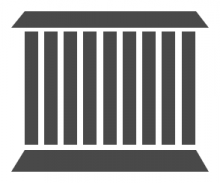It's no secret that skeptics and atheists don't place a lot of value on "personal testimony". There's too much potential for human error, because little of what the person says - by itself - is grounded in objective reality. If a person says he/she saw XYZ do ABC, we're not confirming this statement against something like video recordings... we're just taking it at face value.
Unfortunately for the Bible, virtually all of it is personal testimony... particularly from characters who we don't even know are fictional or not.
Our position is occasionally challenged by people making an argument that eye-witness testimony is valid in court, under certain circumstances. It doesn't tell us much, though. Whether something is "admissible" as evidence, in court proceedings, doesn't indicate how valuable is it... or how much utility it has towards discovering the truth.
As someone who values science, I appreciate a lot of the procedures in criminal and civil trials. It's interesting how a lot of it works... then, you get a sudden hole of total irrationality.
I once served on a jury for a criminal trial.
Out in the courtroom, both lawyers argued their cases. The judge stepped in on a number of occasions, when either one broke protocol. The whole process was very formal, with a lot of checks and balances. Defense and prosecutor lawyers were present in selecting jury members, and had to agree on each selection (this was an extremely slow and tedious process).
These were the things I appreciated - a thorough and methodical process towards increasing the accuracy of this process as much as possible.
Then we deliberated. We were shuffled off into a little room, where we had to decide whether the person was guilty or innocent. It was appalling.
"Why would they [the victim and family] lie?", was the primary argument, among others. At least half of us weren't satisfied with that line of reasoning. I objected, "I don't want to live in a world where three or four people can conspire to send me off to jail, merely by accusing me of something... and off I go."
We needed a unanimous consensus (I think - we weren't clear on that, despite trying to ask), and we were divided. I managed to steer the team towards analyzing what objective evidence was available, and by the end we were all (mostly) comfortable with a guilty verdict. One of the subjective-pleading people thanked me for doing this, even.
I think we hopefully made the right call.
We didn't have to consider objective evidence at all. We could have decided the person was guilty "because our chakras said so". We could have flipped a coin.
As long as we all agreed to it, no one ever - at any point - checked our work. There's no peer review at this stage. We didn't have to write any papers explaining our process or flow, conclusions and assumptions. Nothing.
This is not comparable to science. Scientific knowledge is not established by a closed-door guild of people who don't have to explain themselves.
This is why I scoff whenever an apologist is asking me to compromise on epistemology based on some some major flaw of civil or criminal trials.

